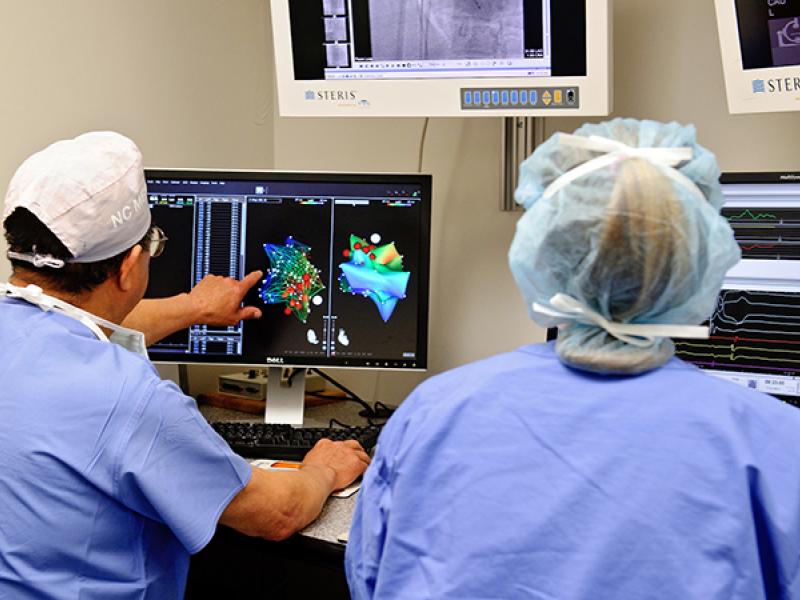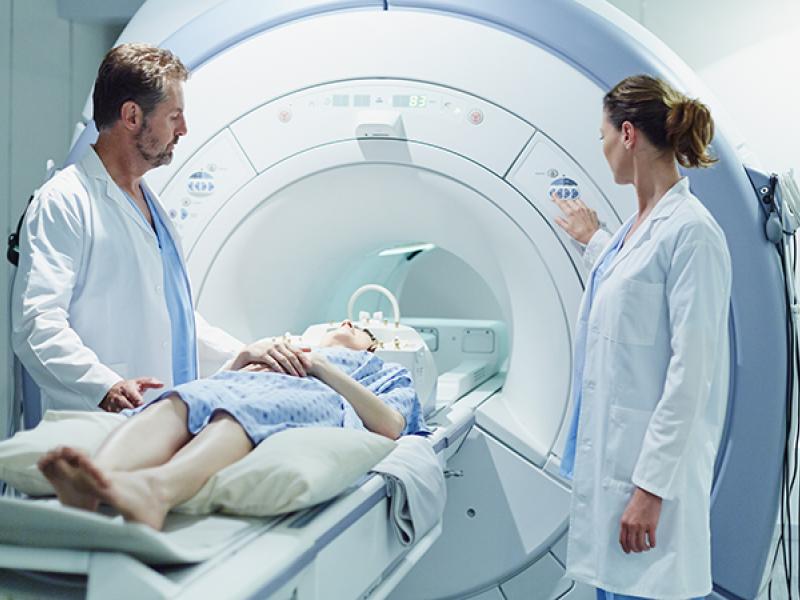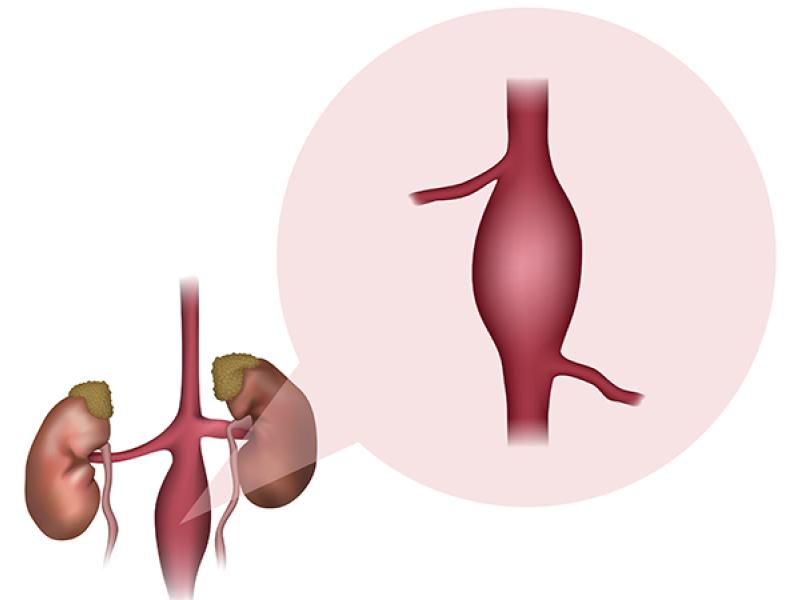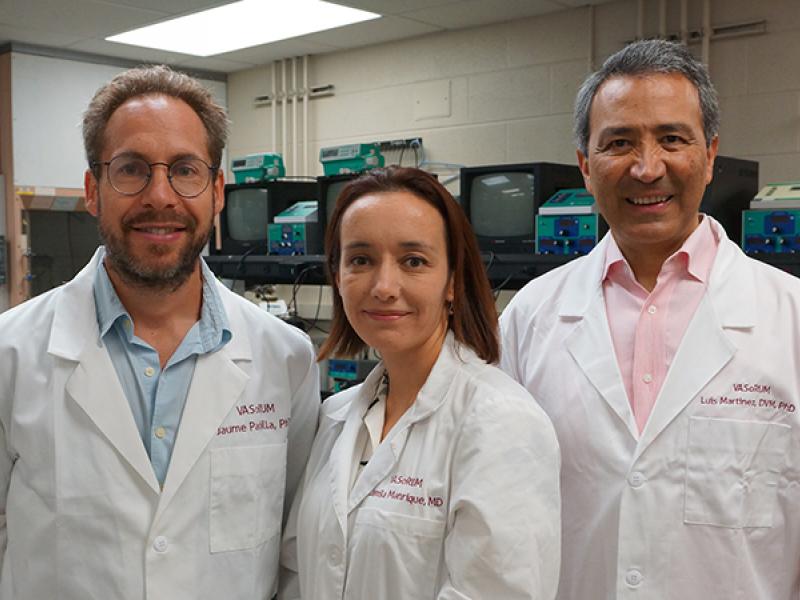The important education mission of the Division of Cardiovascular Medicine is additionally achieved through our daily conferences.
The program requires at least 70% attendance at all conferences. Only fellows with authorized absence, CICU and night float are excused from conferences. Attendance is required at additional conferences when the fellow is assigned to the invasive laboratory and to the electrophysiology service (EP conference on Wednesday 5 to 6 p.m.; Cardiac Catheterization conference on Thursday 5 to 6 p.m.).
Service assignment determines which fellow has primary responsibility for Wednesday case conferences and Friday conferences. The conference material must be planned in concert with the responsible faculty member identified. The audiovisual and internet resources for the conferences should be tested prior to the presentation, which includes handouts, projectors, McKesson imaging platforms, and internet access. Coordination with contributing departments or divisions is expected for relevant conferences (e.g., pathology if available for M&M).
The fellows’ attendance at the Conferences will be recorded by their signing the attendance List and by surveillance of the participant list by the program coordinator during Zoom conferences. Record of attendance is required for documenting the educational experience provided by the Division and for recommending board eligibility.
Monday/Tuesday (Noon – 1 pm)
Core Cardiovascular Disease Curriculum
Review of a major cardiovascular disease topic by faculty. Early in the academic year a general review occurs during boot camp lectures, which include simulation sessions. Later in the year more focused topics are presented. Topics included:
- Cardiocirculatory physiology and metabolism
- Cardiovascular pharmacology
- Heart failure
- Myocardial infarction and coronary artery disease
- Valvular heart disease
- Pericardial disease
- Hypertension
- Lipid abnormalities
- Congenital heart disease
- Cardiovascular risk factors
- Heart disease in pregnancy
- Principles of cardiovascular rehabilitation
- Cardiovascular pathology
- Peripheral and cerebral vascular disease
- Biostatistics
- Cardiac trauma
- Cardiovascular epidemiology
- Pulmonary vascular disease
- Newer imaging techniques, such as magnetic resonance imaging, fast computerized tomography, positron emission tomography
- Ethical issues in clinical practice
- Cardiology as it relates to other subspecialties such as thoracic surgery, nephrology, pulmonary and critical care, endocrinology, etc.
- Cardiovascular diseases in the elderly
- Molecular biology of the cardiovascular system
- Cardiac transplantation
Specific Objectives
- Understanding cardio-circulatory physiology, cardiovascular pharmacology.
- Understanding the basic principles of management of common cardiovascular problems such as acute myocardial infarction, angina pectoris, valvular heart disease, cardiomyopathies, congenital heart disease especially in the adult, congestive heart failure, pulmonary hypertension, pericardial disease, endocarditis, cardiac arrhythmias, and peripheral vascular disease.
- Developing an understanding of preventive cardiology.
- Discussion of lipid abnormalities, their diagnosis and management.
- Heart disease in pregnancy.
- Cardiovascular rehabilitation.
- Cardiovascular pathology including endomyocardial biopsies.
- Biostatistics.
- Ethical issues in clinical practice and in research.
- Cardiology as it relates to other specialties, such as, pulmonary and critical care, nephrology, thoracic surgery.
- Understanding the principles of effective consultation to other services and peri-operative cardiovascular assessment for non-cardiac surgery.
- Understanding the indications, contraindications, timing and complications of cardiothoracic surgical procedures.
Imaging core curricular lectures
(Tuesday, noon – 1 pm) cover topics related to performance and/or interpretation of noninvasive procedures:
- Echocardiography
- Nuclear Cardiology
- CT/MRI
- Stress testing and electrocardiography
Wednesday case conference 12 to 1 p.m. (Required)
Case conferences include echocardiography, angiography, CT, MRI, and electrophysiology cases.
Challenging cases are presented by fellows. The attending involved in the case is expected to be present and involved in case selection and learning objectives.
For each case, a learning objective precedes the presentation
Specific objectives for case conferences
- Establish a learning/teaching objective for every case.
- Present clinical cases and related imaging with focus on decision-making/management in concert with mentor for the case.
- Invite comments and discussion of differential diagnosis and/or management plans for the exemplary case from the fellows and faculty present at the conference.
- Be prepared to discuss in detail a particular aspect of the clinical problem based on such a case. Discussion might include a brief and focused review of literature as applies to that issue.
- Review protocols/guidelines pertaining to management of the case.
- Enhance presentation and public speaking skills.
- Address cost-effectiveness, legal and ethical issues as relate to the case being presented.
Thursday 7:30 to 8:30 a.m. Cardiovascular Medicine Grand Rounds (Optional)
New and exciting cardiovascular topics are presented by cardiology faculty, basic science faculty, or visiting professors. In addition, during the 3rd year of fellowship, each 3rd year fellow will present a topic of their choice. The fellow presentation is expected to be a capstone experience and is a requirement for the fellowship.
Friday 12 to 1 p.m. (Required)
The Friday conferences have four repeating purposes: monthly M&M, research conference, case conference, and journal club.
- The M&M conference will have some routine elements at the beginning to review the spectrum of cases and trends for mortality and readmissions for the CICU/inpatient services. Mortality and readmission data will be provided by the responsible quality assurance member for the hospital. The fellow will select two cases (at most three cases) for review because the outcome was unexpected and/or provided an exceptional learning experience. Every case must include a recap of “lessons learned” and propose possible solutions for either practice or system improvement. Faculty involved in patient care for the case are expected to attend.
- Fellow conference
- Case conference allows a 1st year fellow to highlight the knowledge gleaned by digging deeper into the cardiovascular disease process represented by the case(s). This conference represents learning through teaching.
- “Mini” grand rounds allows the 2nd year fellow to present an academic topic of their choice. The topic must be approved by the program director. The fellows mentor guides the focus of the teaching conference for its depth and breadth.
- The research conference given by fellows focuses on their clinical research at any stage of development, from hypothesis to reporting results. This conference requires mentorship from the faculty member involved in the fellow’s research and will be open to thoughtful criticism of the hypothesis, plan, or results.
- The journal club is a fun deep dive into recent literature, especially on controversial topics and in keeping with the importance of critiquing what is written in the literature. Faculty mentorship is expected.





